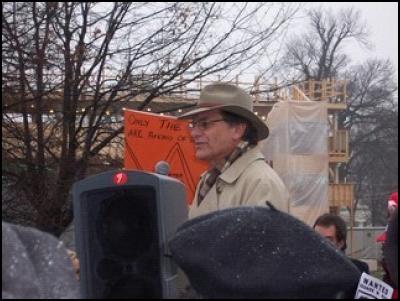 Link: http://www.scoop.co.nz/stories/HL0701/S00386.htm
Link: http://www.scoop.co.nz/stories/HL0701/S00386.htm Blackwell�s Actions In Ohio Boost US Voting Rights
Sorry Record of Violations Spurs Pre-election Suits
New Ohio Attorney General and Secretary of State to Settle in Favor of Voters
Michael Collins�Scoop� Independent News
Washington, D.C.
The newly elected Ohio Secretary of State was asked how she would handle the many voting rights law suits filed against her predecessor J. Kenneth Blackwell. She responded: "When there's a constitutional challenge, if it's a meritorious challenge, we shouldn't fight. We should resolve it as quickly as possible."
19 Jan 2007 In his own way, her colleague, new Attorney General Marc Dann showed what he thought of opposing the voting rights suits by firing the attorneys defending Blackwell and former Governor Taft. State legal services were taken in-house.

Marc Dann campaigning for Attorney General With pro citizen, pro voting rights winners for Attorney General and Secretary of State, there is a very real chance that the
Blackwell techniques used to deny voting rights may have exactly the opposite effect in the near to mid term. The needs for reform are clear and the methods of suppression are as well. Dann and Brunner have no reason to do anything other than what they promised in their campaigns, work proactively to expand the vote and guard against fraud.
Blackwell�s MissionKenneth Blackwell had a mission to complete. He was the most productive of the Bush election activists in 2004. Delivering Ohio was both a spectacular success and a dubious achievement. It secured four more years of Bush�s reckless policies that unified the country as never before; in opposition to Bush! Presidential approval is in the 28-30% range which parallels Nixon�s just before impeachment. Ironically Blackwell�s mission accomplished resulted in unparalleled political failure for his White House patrons.
The 2006 elections promised more of the same in Ohio. Blackwell was in no mood to compromise. He was running for Governor and behaved as though leverage through legislation was a key to his victory. The scandal riddled Ohio Republican party passed one measure that sought to narrow the numbers of those who could actually vote. House Bill 3 passed in February of 2006 was so blatantly restrictive
Common Cause called it �� a devastating piece of legislation that may reverse all of the voter registration and voter turnout gains over the last eight years.�
Nevertheless, Blackwell persisted. Through legislation, regulations, and procedures, he set out to do in 2006 what he�d done in 2004: deliver his votes while discouraging traditional support for the Democrats (read minority and poor voters).
Blackwell�s 2004 maneuvers inspired one of the most persistent grassroots movements in the history of state based voting rights advocacy. Organizations for the homeless, labor unions, citizen activist groups, the League of Women Voters, and others combined to challenge Ohio�s banana republic laws and rulers
Here�s a sampling of the legal challenges that Attorney General Dann and Secretary of State Brunner will be settling. I�m saving the best for last, although these are all highly commendable court efforts.
Everybody v. BlackwellExcellent summaries of these cases can be found at the Election Law @ Moritz
web site.
Strickland v. BlackwellWhile this isn�t the most far ranging suit, it is certainly the most egregious abuse of regulatory power by a Secretary of State in 2006. �Strickland� is Ted Strickland, the Democratic candidate for governor. In Strickland�s home county, the mother of a Blackwell supporter filed a challenge to Strickland�s voting status in that county. The net result of the challenge, had it been carried by the local board, would have been disqualification of Strickland as a candidate for governor. Outrageous, maybe, but elegant in its design, this move would have led to Blackwell�s election as governor by default. With the help of the U.S. District Court for Northern District of Ohio, Strickland proceeded to
quash to action by the board and went onto trounce Blackwell by 900 thousand votes, 60% to 37%.
Ohio Citizen Action v. Blackwell. Ohio Supreme Court In one of the strangest cases, Ohio Citizen Action sought to overturn Blackwell�s regulation stating that precincts were no longer required to post election results at the precinct prior to sending votes off for tabulation.. The complaint stated, �Ohio may face the risk if vote manipulation and outright fraud during the vote tallying process by the Secretary of State�s office.�
The Ohio Supreme Court managed to support Blackwell stating that it was just too late to disrupt the procedures in place for the election.
ABC v. Blackwell. U.S. District Court for the Southern District of Ohio In 2004, Blackwell sought to restrict press access to polling places. In an inventive move, loitering laws were invoked to this end. ABC sued to prevent this from happening again. While ABC failed in its motion, the court reiterated a
previous requirement that Blackwell have polling places post a notice stating that loitering laws were not to be used to discourage the press.
Ohio Democratic Party v. Blackwell. .Franklin County Court of Common Pleas The Democratic Party sought the court to issue writ requiring Blackwell to alleviate congestion at polling places, fix malfunctioning machines, and provide security for voting machines to avoid manipulation. As with each of the other Ohio court cases, this was denied.
Boustani v. Blackwell. US District Court for the Northern District (Ohio) Here is a very special Blackwell regulation, the subject of this suit. This is the Ohio procedure allowing anyone to challenge anyone else as an illegal foreign voter.
If the person is challenged as unqualified on the ground that the person is not a citizen, the judges shall put the following questions:
(1) Are you a citizen of the United States?
(2) Are you a native or naturalized citizen?
(3) Where were you born?
(4) What official documentation do you possess to prove your citizenship? Please provide that documentation.
The court encouraged an agreement by the parties that relieved this outrageous �look and guess� test about �foreigners� voting in an Ohio election.
Northeast Ohio Coalition for the Homeless v. Blackwell. US District Court for the Southern District of Ohio This action sought to overturn the new Voter Identification (Voter ID) requirements in Ohio, central to any effective voter suppression strategy. The court issued a temporary retraining order but the appeals court overruled it. So much for the homeless.
Harkness v. Blackwell. U.S. District Court for the Northern District of Ohio The National Voter Registration Act of 1993 established �procedures that will increase the number of eligible voters who will vote in federal elections.� One procedure was to have any office providing public assistance give out registration forms, help fill them in and accept the finished forms as voter registrations. It seems they were a bit selective in Ohio. The suit cites small counties like Athens and Marion registering more public assistance voters than 500 thousand or more population counties like Hamilton (Cincinnati), Franklin (Columbus), Montgomery, and Summit. This was so outrageous, the plaintiffs prevailed�on December 28, 2006, just a bit late.
Project Vote v. Blackwell. U.S. District Court for the Northern District of Ohio The complaint argues: �These onerous and vague new laws and regulations chill core political speech and association and have forced all of the plaintiffs to seriously curtail or halt their voter registration and related core political speech and association activities.� Precisely as intended, I suspect. Groups like Project Vote were given all sorts of unnecessary requirements to register voters and penalties were in place to punish even trivial deviance from this Blackwell absurdity. This case was continued until February, 2007.
� & Potentially the most revolutionary case in the history of modern voting rights
League of Women Voters v. Blackwell. U.S. District Court, Northern District of Ohio This is quite simply
the most comprehensive voting rights law suit imaginable. The Ohio League of Women Voters and long time election law attorney and voting rights champion Cliff Arnebeck put together a case that may serve as the blue print for reforming Ohio and as a model for other states. The election of Attorney General Marc Dan and Secretary of State Jennifer Brunner, both sympathetic cleaning up the mess Blackwell and Taft created may introduce a new level of voting rights and put in place the type of comprehensive program that guards against the varieties of election fraud introduced and intensified since Election 2000.
There are eight key arguments that begin the case. They will be summarized here and then considered in more detail in the next article on this subject;
1) ��through a pattern of maladministration, wanton disregard of their duties under Ohio and federal law, and the creation and maintenance of a non functioning voting system� defendants have violated citizens fundamental Constitutional right to vote.
2) �As a direct result, for years the rights of all eligible citizens to cat a meaningful ballot has been severely burdened and in many cases denied altogether. � The foreseeable result is massive disenfranchisement and unreasonable dilution of the vote.�
3) The Governor and Secretary of state are responsible for administration and effective operation of this system and they have failed again and again.
4) Ohio�s voting system has had problems since the 1970�s which have continued without remedy.
5) The November 2004 election was the apogee of the failed system with 28% of voters experiencing difficulties voting and tens of thousands disenfranchised.
6) �The violations of Constitutional and federal law within Ohio�s voting system are pervasive, severe, chronic, and persistent�The foreseeable, cumulative effects of the non uniform, non-standard, and completely deficient voting standards, processes and resources in Ohio has disenfranchised or severely burdened the right to vote for � Ohio citizens.�
7) The pattern of problems and failure to resolve them is further illustrated by the breakdown s �allowed to occur when that county (Lucas) purportedly was subject to special oversight by Defendant Secretary of State as a result of prior documented failures to protect the right to vote in Lucas County.�
8) The action doesn�t challenge past elections it is offered �to put in place a competent and fair voting system as required by the Constitution and federal voting rights laws to ensure that every Ohio resident eligible to vote can do so on fair and equal terms ant that each eligible vote is fairly and equally counted � no matter where or how it is cast.�
The opportunity to enact a truly inclusive, fair and accountable voting system in the state of Ohio is unprecedented. With Secretary of State Brunner and Attorney General Dann replacing Blackwell and Petro, Ohio has the opportunity to lead the nation in meaningful election reform and voting rights guarantees worthy of all citizens.
To be continued.
Cliff Arnebeck, attorney for the Ohio League of Women Voters suit, at a voting rights rally, Lafayette Park, Washington, DC, January 6, 2005. END************* �Copyright: Please feel free to reproduce and distribute this in any fashion you feel suitable with an attribution of authorship and the publisher, �Scoop� Independent News, plus a link to the article.